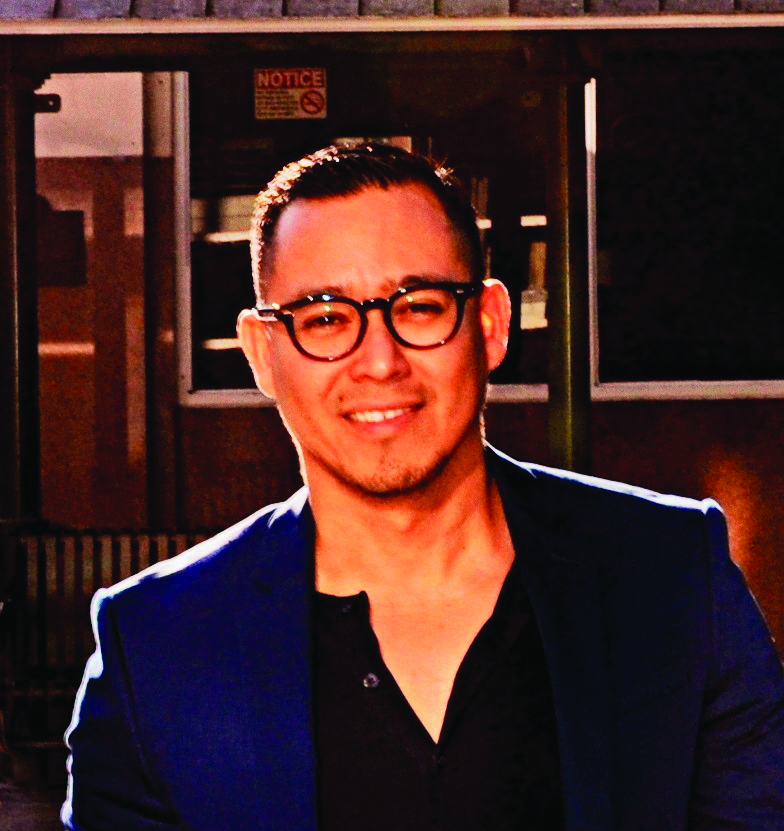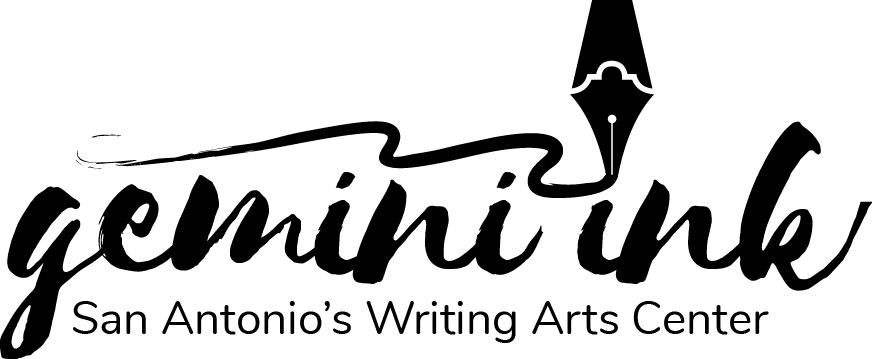The Writer’s Desk features the desks and writing practices of Gemini Ink faculty, visiting authors, teaching artists, volunteers, students, interns, staff, partners and more. Receive new posts in your inbox by subscribing to our newsletter at bit.ly/geminiinknewsletter.
Describe your first writing desk. How is it different (or not) from your current writing desk?
My first writing desk was not mine at all, but I would sit there and write. It was at a job I had throughout my senior year of high school, at a print shop, and the desk had a typewriter. The nice workers there knew I liked to write, so whenever I clocked in, they would allow me to sit at that desk for a while and write. I wrote poems, mostly. And I have no idea what happened to those poems. Hard to remember what I wrote. But I do remember the faces of the nice folks I worked with. That, I won’t forget. Currently, I have a writing desk, but I rarely use it for writing. I mean, I do, but not as often as I should. Most of my writing takes place elsewhere, away from it.
How important is it to you to have stability in your writing routine?
It’s important, but not as much as, say, ten years ago. I think I am at a place in my writing life where I don’t have to be pouring out my soul every day, or feel like I have to write every day, or every week, or every month, etc. I don’t have contracts to fulfill. I wish. But I am patient. Whatever I am doing now, I see it as preparation for opportunities that will come later. I mean, I do write almost every day, or as I said before, I think about writing every day, but I don’t have the guilt of not doing it if I don’t feel like it. Of putting words on paper. Sometimes I just say, “fuck writing,” and watch a movie instead. Thing is, watching movies gives me ideas for writing. So, in a sense, whatever I do—whether it’s taking a drive, or watching a movie—is part of my process as a writer. I see the world like that—shaping the stuff in it into stories, poems. In many ways, when I am not writing, I am still writing—the subconscious, the body, etc. When I don’t have the pressure to write is when I write the most. I think it has to do with finding my own pace, and knowing what needs to be done and how much time I have to do it, and then doing it. Having stability is great, but I know my life is not always going to be stable, so I’d be ready when it’s not.
What is your secret talent? Does it ever pop up in your writing?
Not sure it’s secret anymore, but I paint quite a bit. Paint and draw. Draw and doodle. Make marks on paper and on canvas. And now more than ever, this, too, has become part of the constant dialogue I have with writing.
What is the one piece of writing advice that you value most?
Be consistent. If possible, write something every day, even if it’s just a word. But also give it a break when it feels like a job you don’t want to do. You don’t always have to be writing to be a writer. To feel like one. Thinking like a writer can be enough to keep you going before you put something down on paper again.
What theme or symbol often emerges in your work? Why are you drawn to this theme/symbol?
In many of the new poems, I am writing the lexicon tends to be about the border and immigration; about displacement and separation. Symbols associated with geography find their way into the stanzas—rivers and deserts, for instance. I am not sure if I am actively seeking these symbols, or necessarily drawn to them—I think they are just part of my personal experience and are now part of my poetic language. For now, they are serving a purpose.
Who are your heroes in real life? What do you admire most about them?
My parents are my heroes. My siblings, too. But also, most of all the teachers I ever had. Hard to choose just one group. Let’s just say that all them have/had three things in common: Compassion. Vision. Love.
What is your next project?
At the moment, I am working on four projects—a book of Frontextos; my second book of lyric/narrative poetry; a poetry chapbook by Juan R. Palomo titled, Al Norte, and a bilingual fiction chapbook by ire’ne lara silva, which my micro-press Alabrava will publish. Palomo’s chap is at the printer’s, and lara silva’s will be out early fall. So pretty busy, but a good busy.
If people want to learn more about your work, where should they go?
They can visit my website: https://www.octavioquintanilla.com/ and connect on instagram: @writeroctavioquintanilla

Octavio Quintanilla is the author of the poetry collection, If I Go Missing (Slough Press, 2014) as well as Wasted Time (Alabrava Press, 2019) and served as the 2018-2020 Poet Laureate of San Antonio, TX. His poetry, fiction, translations, and photography have appeared, or are forthcoming, in journals such as Salamander, RHINO, Alaska Quarterly Review, Green Mountains Review, and The Texas Observer. His Frontextos (visual poems) have been published in journals such as Poetry Northwest, Borderlands: Texas Poetry Review, About Place Journal, and The Windward Review, and his visual work has been exhibited in many locations including the Southwest School of Art, Presa House Gallery, Equinox Gallery, and The University of Texas—Rio Grande Valley (Brownsville Campus). Dr. Quintanilla holds a Ph.D. from the University of North Texas and is the regional editor for Texas Books in Review and poetry editor for The Journal of Latina Critical Feminism & for Voices de la Luna: A Quarterly Literature & Arts Magazine. Octavio teaches Literature and Creative Writing in the M.A./M.F.A. program at Our Lady of the Lake University in San Antonio, Texas.



